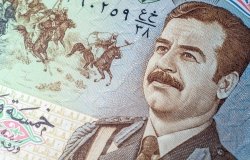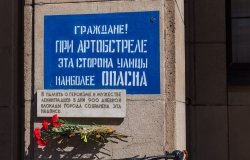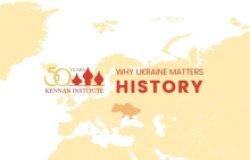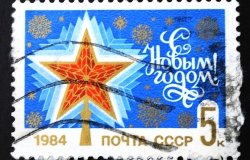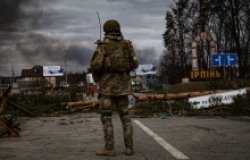New NPIHP Documents Show Iraqi Responses to US Deterrence Signaling before 1991 and 2003 Wars
NPIHP and CRRC release new Iraqi docs bearing on Iraqi responses to US deterrence signaling before during and after the 1991 Gulf War and the 2003 invasion of Iraq.

The Nuclear Proliferation International History Project, along with the Conflict Records Research Center, have released 26 Iraqi documents from Saddam Hussein’s regime on the Wilson Center's Digital Archive. The documents, along with full English translations, illuminate Iraqi responses to US deterrence signaling before, during and after the 1991 Gulf War and the 2003 invasion of Iraq. They were released for “Deterring New Nuclear Weapons States?,” a workshop co-sponsored by the Woodrow Wilson Center and Stanford University’s Center for International Security and Cooperation (CISAC).
- “Transcript of a Speech Given by Saddam Hussein on „The Role of the Iraqi Armed Forces in the Arab-Zionist Conflict‟ at Al-Bakr University,” 3 June 1978, SH-PDWN-D-000-341
- “Revolutionary Command Council Meeting after the Baghdad Conference of 1979,” 27 Mar 1979, SH-SHTP-A-000-553
- “Saddam and His Advisers Discussing Iraq’s Decision to Go to War with Iran,” 16 September 1980, SH-SHTP-A-000-835
- “Saddam and Senior Iraqi Officials Discussing the Conflict with Iran, Iraqi Targets and Plans, a Recent Attack on the Osirak Reactor, and Various Foreign Countries,” 1 Oct 1980, SH-MISC-D-000-827
- “Transcript of a Meeting between Saddam Hussein and the Armed Forces General Command,” 22 November 1980, SH-SHTP-D-000-856
- “Meeting between Saddam Hussein and His Senior Advisors Following the Israeli Attack on Osirak,” Circa 1981, SH-SHTP-A-001-480
- “Saddam Meeting with His Cabinet to Discuss the 1982 Budget,” Circa 1982, SH-SHTP-A-000-635
- “Military Manual on the Tactical Use of WMD, Vol. 2 Part 2,” 22 Jan 1987, SH-IZAR-D-001-490
- “Correspondence between the MIC and the Petro Chemical Group Regarding a Letter from A.Q. Khan Offering Assistance in Developing Iraq’s Nuclear Weapons Program,” 06 Oct 1990, SH-MICN-D-000-741
- “Saddam Hussein and the Revolutionary Command Council Discussing the Iraqi Invasion of Kuwait and the Expected U.S. Attack,” 15 Jan 1991, SH-SHTP-A-001-042
- “A Revolutionary Command Council Meeting about Coalition Operations against Iraq,” 18 Jan 1991, SH-SHTP-A-001-043
- “Meeting between Saddam Hussein and His Officials after the First Gulf War,” 16 Dec 1991, SH-SHTP-A-001-458
- “Saddam Meeting with Ba’ath Party Members to Discuss the Results of the UN Inspectors’ Mission to Look for WMD,” 19 Jun 1995, SH-SHTP-A-001-295
- “A Report on Iranian Efforts to Obtain Nuclear Weapons,” 1992, SH-MODX-D-001-291
- “Meeting between UN Biological Inspectors and Iraqi Officials Including Dr. Rihab Taha,” Circa 1993 to 1998, SH-MISC-V-001-426
- “Meeting between Saddam Hussein and Top Political Advisors to Discuss a Visit by Prime Minister Tariq Aziz to the United Nations,” Circa 1994, SH-SHTP-A-001-256
- “Meeting between Saddam and Political Advisors Regarding Hostilities with Israel, Iraqi Defense Capabilities, and Iraqi-Syrian Relations,” 25 Jan 1995, SH-SHTP-A-000-732
- “Meeting between Saddam and His Security Council Regarding Iraqi Biological and Nuclear Weapons Program,” 05 Feb 1995, SH-SHTP-A-001-011
- “Meeting between Saddam Hussein and the Revolutionary Council Regarding the Sanctions Placed on Iraq and Tariq Aziz’s Trip to the UN Security Council,” Circa 08 Nov 1995 to 28 Dec 1995, SH-SHTP-A-000-789
- “Saddam Hussein Meeting with the General Command of the Armed Forces Regarding Iraqi Development and Defense Theory,” Circa Jan 1996 to Jun 1996, SH-SHTP-A-001-202
- “Training Documentation Pertaining to Nuclear, Chemical, and Biological Threats to the Republican Guard and Iraq,” 16 Oct 2000, SH-RPGD-D-001-454
- “Meeting between Saddam Hussein and Top Political Advisors about a United Nations Air Survey Request,” Undated, SH-SHTP-A-001-251
- “Meeting between Saddam Hussein and Top Political Advisors Concerning Diplomacy with the United States and Russia,” Undated, SH-SHTP-A-001-254
- “Meeting between Saddam Hussein and His Cabinet Discussing a Plan to Develop Iraqi Cities,” Undated, SH-SHTP-A-001-400
- “Cabinet Meeting with Saddam Hussein and the Atomic Energy Committee,” Undated, SH-SHTP-A-001-492
- “Meeting between Saddam Hussein and His Military Commanders after the First Gulf War,” Undated, SH-SHTP-V-001-237
Related Programs

Nuclear Proliferation International History Project
The Nuclear Proliferation International History Project is a global network of individuals and institutions engaged in the study of international nuclear history through archival documents, oral history interviews, and other empirical sources. At the Wilson Center, it is part of the Wilson Center's History and Public Policy Program. Read more

Cold War International History Project
The Cold War International History Project supports the full and prompt release of historical materials by governments on all sides of the Cold War. Through an award winning Digital Archive, the Project allows scholars, journalists, students, and the interested public to reassess the Cold War and its many contemporary legacies. It is part of the Wilson Center's History and Public Policy Program. Read more

History and Public Policy Program
The History and Public Policy Program makes public the primary source record of 20th and 21st century international history from repositories around the world, facilitates scholarship based on those records, and uses these materials to provide context for classroom, public, and policy debates on global affairs. Read more




